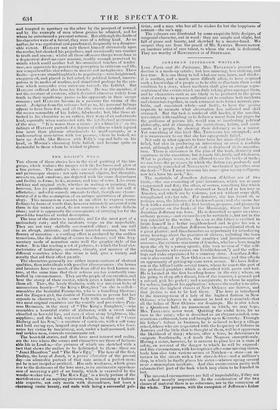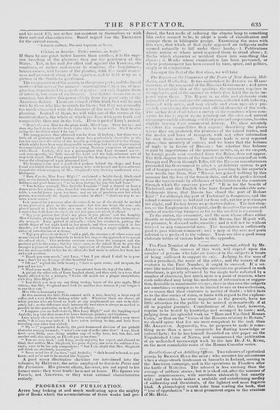JONATHAN JEFFERSON WHITLAW.
LIKE Paris and the Parisians, Mrs. TROLLOPE'S present pro- duction is a made-up article; but less amusing, less striking, and
less true. It is one thing to tell what one sees, hears, and thinks: it is another, and a much more difficult to have acquired such a knowledge of a people as to be able to illustrate their social condition by a story, whose incidents shall give an average repre- sentation of the events which are daily taking place amongst them, and by characters such as are likely to be produced in the given state of society—to possess sufficient art to combine both incidents and characters together, in such a manner as to form a natural, pro- bable, and consistent whole—and lastly, to have the genius requisite to animate what observation has collected and skill arranged. But the task is rendered still harder, if the novelist, not content with enabling us to deduce a moral from her pages for the guidance of private life, would aim at inculcating political philosophy, and at changing the institutions, habits, and staid- ments of a people, by showing their debit-mil as in a mirror. Yet something of this kind Mrs. Tant.t.oes has attempted; and it is unnecessary to say that she has egregiously failed. Not only in what appears to have been her main object has she failed, but also in producing an interesting or even a readable novel, although a good deal of craft is displayed in its manufac- ture. There is cleverness in the plan of the work, dexterity and smartness in the execution; but kwants life, truth, and wholeness.
What is perhaps worse, we, are allowed to see the tricks of trade ; we can trace the processes by which the fiction was produced; and are strongly reminded of NoaasasENs' mechanical speeches over the dead—" Nov I must measure his nose—give me my callipers; now let's have his neck." &c.
The materials of Jonathon Jefferson Ithithar ate of two kinds,—the one consisting of pure inventions, which are at once
exaggerated and ; time other, of scenes, something like which Mrs. TROLLOPE might have observed or heard of in her tour in America, and which are by violence, vet not without some skill, transplanted into her tale. For instance, she has heard of, or parlays seen, the labours of a backwoodsman; and she opens her book with a narrative of the first lecation, progress, and prosperity of a squatter on the banks of the Mississippi, where her hero Jonathan Jefferson was born. He is described as quite au extra- ordinary person,—and extraordinary lie certainly is, but not in the way intended by the writer. As soon as the father is enabled to locate himself in a better neighbourhood and to give his son a little schooling, Jonathan Jefferson becomes confidential clerk to a great planter; and thus furnishes an opportunity for introducing many hearings about the practices of slavery, including the fears and suspicions of planters, the cruelties and licentiousness of overseers, the virtuous resistance of females, who have been taught upon the sly by a young apostle, (time very reverse of " the self- seeking finiatics who canker our Establishment,") and the suffer- ings and risks experienced by a runaway slave. Jonathan Jeffer- son is also carried to New Orleans on business; and this affords an opportunity of getting-up some town scenes. We have Jeffer- son at the billiard-table several times, where he enacts the part of the professed gambler; which is described with gusto and tact. He is located at the first boarding-house in the city ; where, on his going to sleep after dinner, two of the inmates, a general and a colonel, pick his pocket ; and a magistrate, to whom he applies for redress, laughs at his application: whence the reader is to infer, that even the highest classes at New Orleans are thieves, and that justice is not to be had there. The hero is introduced to the drawing-room of a lady of the highest fashion in New Orleans; who behaves in a manner to lead us to conclude that all the ladies of New Orleans are demireps. Ile is also taken to a Quadroon ball ; an amusement to which, we may hope, Mrs. Taost.oes never went. Quitting the sinful hero, let us turn to time saint ; who is described as an elegant-minded, con- scientious enthusiast, born and brought up in Kentucky. Through his father's failure in business, he is reduced to keep a village school,(those who are acquainted with the frequency of failures in -America and the little that is thought of them, will best appreciate the likelihood of this); whence, after a time, he determines to emigrate Southwards, and teach the Negroes surreptitiously. Having a sister, however, he is anxious to place her in a state of safety, on account of the danger to which be will be exposed: and this circumstance, with his inquiries after some missing slaves, leads him also into various scenes at Natchez—a store—an in- terview in the streets with a low slave-holder—and a milliner's shop, in which he dually places his sister—whence spring several more commonplace incidents. And this enumeration pretty well exhausts that part of time book which may claim to be founded in fact.
The invented circumstances are full of improbability, if they are not indeed morally impossible. In the combination of the two classes of material there is no coherence, nor in time connexion of the whale. The persons, with the exception of Jefferson s father and his aunt Cli, are either inconsistent in themselves or with their national characteristics. Small regard has the THOLLOPE for the critical canon,
" Intererit niultum, Davusne loquatur, an Lyres, . . . . . . . .
Co'chug, an Assyrius : ThyIffs nutritus, an Argis."
If there be one point better known than another, it is the supe- rior breeding of the planters: they are the gentlemen of the States. Yet, in her zeal for effect and against the Yankees, she combines, or rather endeavours to combine, the haughtiness, luxuriousness-, and licence of the planter, with the rustic cianee mess and provincial slang of the squatter, mid to hull it up as a
pietme the Southern gentleman.
The e xageerat ion of the wetter, in the graver parts, mid t!i literal matter-afelic:IlesS of the manner-- uneneehtened by a ray of ima- gine :jell, unanimidcd by a spark et genius— not only deprive them of interest, but even et excitemeet. The lighter ealies are mere amusine, but derive this power chiefly from the poculiitrit% 1.f t he America:1 dialect. There are several of this kind, that will be met with by those %vim like to search ew them ; but they are generally too much cent,cetea with the business of the novel to bear trigia- planting. Instead of them, we will take one of the scenes at the mantuateaker's, the whole of which are dime wit it more truth and congeniality than any in the book. Here is part of Lucy's arrival.
" furies the new Miss for the plain •work, Miss Clary. Show her in ; and then step back to me for the frock skirts she's to begin with. She'll be after eating her breakfast while I tix 'cm." The young person thus addressed was far from ill.looking ; but there was a little air of pi etension and hauteur about her, particularly eliservabie as she ran her eyes over the attire Of the Initolite personage commit:dl to her charge, which might have been very disagreeable to one who had in any degree aspired to competition' with the elegance of a young Natchez sempstress of unmixed white blood. Luckily, this was a presumption that Lucy dreamed not : and, consequently, the little toss of the bead atol the lazy, reluctant sort of step with which Miss Clary preceded her to the keeping-reotn, were as hartli- less as the chir pings of a gay plumaged birth The keeping-moot POW %vas a good -sized indoor behind the shop ; and Lucy found assembled there four young women, who, with herself and her conductor, formed the whole company of Mts. Shepherd's very thriving needlework esta- blishment.
" How d'ye do, Miss Lucy Nigh?" exclaimed a lnight-faced, black eyed girl, as she entered, whose countenance ex tressed, in pretty equal proportions, boldness and geod-hunionr; " we've been lookine for you this half hour."
" You behave yourself, Miss Ara! ella Tonikhis !" said a damsel at least a
dozen years her nior ; who, from her situation at the head of a long work- table, a careful frown upon her brow, and an air of precision over her wlode person, was evidently the. deputy conuaander-in chief : " that's no way to re- ceive a new- paused for a moment after she entered, to See if she should be invited to any partieular place in the apartment : but this not being the ease, she placed lietsell at a little tilde near (me of the window's, which, being open, t:mpted her butt from the fresh air awl tine pros:iect which it offered-
" your pardon, but that's my place if you please," said the haughty
Miss (To inda, placing her hand upon' the bark of the chair thus unintention- ally usurped. 'Lucy quitted it instantly ; when her conductor, 'tutting the middle finger of her right hind in her mouth, and then ensconcing it in her thimble, sat herself down to work without uttering a single syllable inure, either of iutcduetiva or welcome.
7aatt you please to sit bete' " said a girl, the sweetness of whose voice and
accent caused Lucy involuntarily to hasten her step as she alio oached to accept the offered chair. This welcome overture came from the youngest and the prettiest girl in the room; but her large eyes, as she raised them to give the stranger a glance of welcome, had an expression of shyness that made Lucy feel the more grateful to het for the divot she had made to relieve her from her awkward position.
" Thank you very much," said Lucy, " but I ant afraid I shall be in your way; don't let me derange all this beautiful lace." " Oh no!" replied the little beauty ; " here is quite room, and to spare, fur you and me too." " Mind your work, Miss Talbot," was uttered from the top of the table. A girl on the other side of Lucy laughed aloud, and then said, in a time that hardly affected to he a whisper, " Cross old maids are a plague everywhere, a'n't they Miss ?"
" You think you may say any thinda' to-day, 'cause of the pineapple, Miss Olivia; but Mts. Shephetai must look for another fore-woman if your tongue's to run that rate "
Miss Olivia hummed a tame.
At this moment the little Ditto entered with a tray, hearing a large cup of coffee, and a very delicate-looking white roll. Wherever there are slaves, all white persons who are hired to work at any employment are sure tu be deli- cately fed ; as the difference made between the two races is always as marked as possible in this particular, as well as in all others.
" I suppose you are half-starved, Miss Lucy Illigh?" said the laughing-eyed Arabella, III a tone that scenic(' to hover between quizzing and kindness.
Lucy wisely einae to answer to the latter only, and replied with a very sweet smile, " It is very true bidet d. I have eaten nothing to-day, and have been travelling ever since four o'clock.



























 Previous page
Previous page